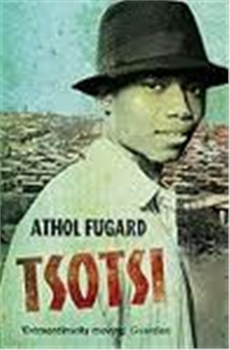Description
Tsotsi is a real find, by one of the most affecting and moving writers of our time ( Financial Times )-- and the novel is now being reissued to coincide with the release of a feature film, which is already being compared to 2004's runaway hit City of God .One of the world's pre-eminent playwrights, who could be a primary candidate for either the Nobel Prize in Literature or the Nobel Peace Prize (Mel Gussow, The New Yorker ), Athol Fugard is renowned for his relentless explorations of personal and political survival in apartheid South Africa - which include his now classic plays Master Harold . . . and the Boys and The Blood Knot . Fugard has written a single novel, Tsotsi, which director Gavin Hood has made into a feature film that The Times (London) calls a remarkable achievement and is South Africa s official entry for the 2006 Academy Awards.Set amid the sprawling Johannesburg township of Soweto, where survival is the primary objective, Tsotsi traces six days in the life of a ruthless young gang leader. When we meet Tsotsi, he is a man without a name ( tsotsi is Afrikaans for hoodlum ) who has repressed his past and now exists only to stage and execute vicious crimes. When he inadvertently kidnaps a baby, Tsotsi is confronted with memories of his own painful childhood, and this angry young man begins to rediscover his own humanity, dignity, and capacity to love.
About the Author
Works, includingMaster Harold ... and the Boys(1982), of South African playwright and directorAthol Fugardexplore racial tension and inequality especially during apartheid.Harold Athol Lannigan Fugard, better known as Athol Fugard, acted.Sheila Fugard, his wife, andLisa Fugard, their daughter, also follow.An Afrikaner mother bore Athol Fugard to a Roman Catholic father of Irish extraction. He considers an Afrikaner but in English reaches a larger audience. After his birth, his family quickly moved to Port Elizabeth. In 1938, the Marist brothers college, a Roman Catholic primary school, enrolled him. Awarded a scholarship, he afterward enrolled at the local technical college for his secondary education. He then enrolled in the University of Cape Town but dropped. He sailed around the world, mainly in the Far East, on ships.Fugard married Sheila Meiring, now known as Sheila Fugard, then an actress, in September 1956. She later authored novels and poems in her own right. They started the serpent in Port Elizabeth before moving to Johannesburg, where a court employed him as a clerk.Fugard saw suffering under the pass laws, and the court environment provided a firsthand insight into the injustice and pain.WithZakes Mokaeand a group of black actors, Fugard first started withNo Good Friday. Returning to Port Elizabeth in the early 1960s, he with a group of actors first performed in the former snake pit of the zoo, hence the name, the serpent.The political slant bought him into conflict with the government. To avoid prosecution, he started to take overseas. After people producedBlood Knotin England, they withdrew his passport for four years. In 1962, his public support for an international boycott against segregated theater audiences led to further restrictions.He extensively withJohn KaniandWinston Ntshona, black actors, shoppedSizwe Banzi is Dead,The Island, andStatements after an Arrest under the Immorality Act.He early shopped with Kani and Ntshona and staged dramas in black areas for a night, and the cast then moved to the next venue, probably a dimly lit church hall or community center. The audience, normally poor migrants, labored and resided hostels in the townships. At this time, politics mirrored the frustrations in the lives of the audience. Fugard drew the audience into the drama; members applauded, cried, and interjected their own opinions. From the audience, Fugard used feedback to improve; he expanded and deleted the parts.For example inSizwe Banzi is Dead, migrant Bansi assumes identity and gets the important pass to get a job only to survive. When he debates worthiness of sacrifice of the effective "death" of Sizwe, the audience appreciated a nonentity without a pass and consequently cried out, “Go on, do it!"People improvised available sets and props, which helps to explain the use of the minimalist productions. In 1971, people eased the restrictions against Fugard and allowed him to travel to England toBoesman and Lena. In 1982, he composed a semi-autobiographical drama.Fugard showed against injustice on both sides of the fence and inMy Children! My Africa!attacked the national congress for deciding to boycott schools to cause the damage that he recognized to a generation of pupils.With the demise, Fugard first performedValley SongandThe Captain's Tigerfocused on personal rather than political issues.People regularly produce, and he won many awards.
